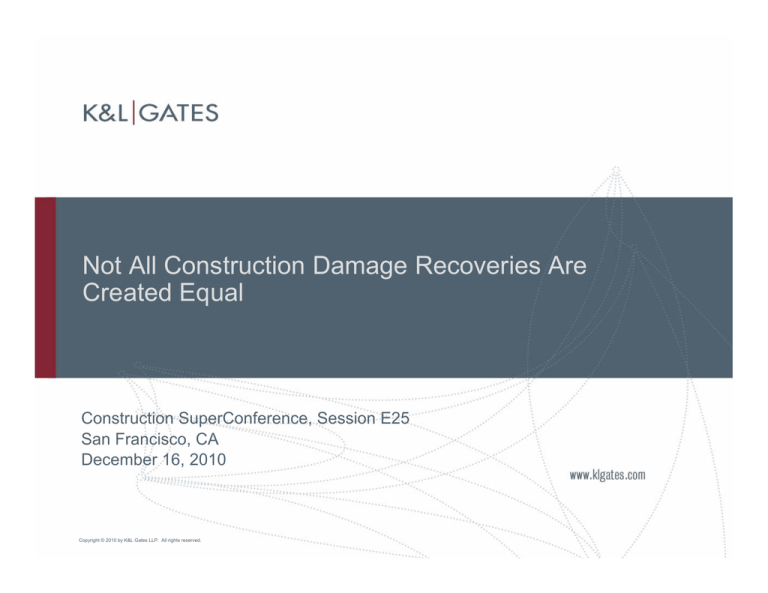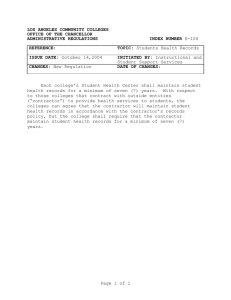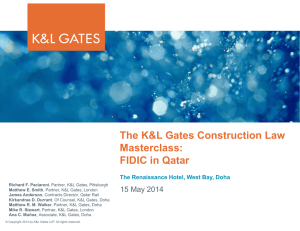
Not All Construction Damage Recoveries Are
Created Equal
Construction SuperConference, Session E25
San Francisco, CA
December 16, 2010
Copyright © 2010 by K&L Gates LLP. All rights reserved.
Speakers
Tim Pierce
Partner
K&L Gates LLP
310.552.5058
timothy.pierce@klgates.com
Paul Bruno
Managing General
Counsel
Fluor Corporation
Dave Delman
Chief Legal Officer &
Secretary
Chicago Bridge & Iron
469.398.7654
paul.bruno@fluor.com
Larry Prosen
Partner
K&L Gates LLP
Jason Richey
Partner
K&L Gates LLP
202.778.9213
412.355.6260
lawrence.prosen@klgates.com
jason.richey@klgates.com
ddelman@cbi.com
1
A.
Introduction – Objective
Compare how typical construction claims on the
same project will vary based on the venue of the
project
State and Local
Federal
International
2
B. Hypothetical Project – Waste Water
Treatment Plant
3
B. Hypothetical Project – Waste Water
Treatment Plant
4
B. Hypothetical Project – Waste Water
Treatment Plant
5
C. The Three Different Venues
1. California
2. A “typical” Federal Project
3. International (ICC, LCIA, ICDR of “Ad Hoc.”)
6
C. The Three Different Venues
7
D.
Project Has Encountered Difficulties
1. Design changes have increased the scope of work
2. Contractor has had difficulty with a subcontractor
that it had to terminate for default
3. Contractor has a labor overrun
4. Project completion is delayed due to owner and
contractor causes
5. Owner claims liquidated damages
8
E. Forums
State and Local Projects: Courts vs. Arbitration
Federal Projects: United States Court of Federal
Claims v. applicable Board of Contract Appeals
International Projects: Typically, Arbitration
(UNCITRAL vs. Institutional, Adjudication first if
England is the forum?)
9
F.
Delay Claims
1. Contractor Extended Site Overhead
a.
State
Requires some form of schedule analysis
Accounting for overhead costs
Exacting proof of loss, or more likely than
not?
Concurrent delay
10
F.
Delay Claims
1. Contractor Extended Site Overhead
b.
Federal
DCAA or OIG Audit generally required
If over $100k, must be certified under
Contract Disputes Act and subject to False
Claims Act
Must be approved at a settlement level
Must exhaust administrative remedies prior
to appeal
CO Final Decision or Deemed Denial
Full schedule and cost analysis
11
F.
Delay Claims
1. Contractor Extended Site Overhead
c. International Arbitration Under Common
Law (E.g., US, UK, CAD or AUS Law.)
Proof can be more exacting, especially if forum is
UK, but with no depositions, documents are the
key, making document production huge
Universal norms of evidence will apply
Still need experts, but tribunal may appoint its
own expert, particularly for schedule analysis
Dealing with concurrent delay a must
Arbitrators engaged and able to understand the
evidence?
12
F.
Delay Claims
1. Contractor Extended Site Overhead
d.
International Arbitration under Civil Law
Much less reliance (if at all) on oral
testimony, either through witness statements
or through oral testimony
Arbitrators will take larger role in how the
case is presented
Document discovery may be very limited
If contract is governed by Civil Law, best to
have a very detailed arbitration clause
13
F.
Delay Claims
2. Home Office Overhead – Eichleay
a. Federal
Federal law is clear
Eichleay Corporation, ASBCA No. 5183, 60-2
BCA ¶2688 (1960), aff'd on recon., 61-1 BCA
¶2894
Recent Case law restricting use of Eichleay
b. State
Not much different – Maryland, Virginia,
Ohio, Texas, others follow Eichleay
c. International
Subject to actual proof
No Eichleay
14
F.
Delay Claims
3. Liquidated Damages
a. State and Federal
Now in virtually all contracts
Unenforceable if considered a penalty
Only assessable on inexcusable,
contractor-caused delay
Will “no harm no foul” apply?
b. International
Almost always in International contracts
If UK law, “no harm no foul” will not apply
UNIDROIT principles may provide refuge if
LDs are unreasonably high, if not in the UK
15
G. Extra Work
1. Unpaid Change Orders
a. State
Need to conform to contract requirements
Juries not as likely to fault contractor for
insignificant deviations
Some states (e.g., Texas) will award attorney
fees on a breach of contract basis
b. Federal
Need to conform to the FARs to get these paid
16
G. Extra Work
1. Unpaid Change Orders
c. International
Arbitrator more likely to hold you to the terms
of the contract and notice provisions,
especially if expressed as a condition
precedent
Be aware of the contract clause requiring
written notice to proceed with extra work;
Implied or oral notice won’t fly
Proof of actual additional cost is key; Keeping
the project cost report current is essential
17
H. Labor Inefficiency
a. State
Put up an expert and go for it
b. Federal
Federal law recognizes cumulative impact claim
but need more analytical approach like
measured mile, Army Corp study or other
accepted method
Bell/BCI Co. v. U.S., 570 F.3d 1337 (Fed.Cir 2009) –
Release/Waiver & Cumulative Impact
Total cost frowned upon, but still possible if
preconditions are met
18
H. Labor Inefficiency
c. International
Productivity claims are recognized, but poorly
understood
Proof is the challenge, making
contemporaneous record keeping the key
Measured Mile is the best, if not only, approach that
will succeed; Comparing efficiency to the isometric
may be required
MCAA Factors, USACE, CII Studies alone likely will
not fly, but may be useful as a cross reference
“Sanity checking” results against cost report a must
Total cost approach nearly impossible
19
I.
Consequential damages
a. State
Are limitations in standard contracts enforceable
Are consequential damages defined in the
contract
b. Federal
No consequential damages
Argue over what constitutes consequential
damages
c. International
Comparable to State law
20
J. Claims Against Design Professionals
a. State
Viable Claim, but be aware of tort reform that
requires a certified act of negligence
Must Prove Standard of Care
Contractor claims may be barred by Economic
Loss Rule
b. Federal
Government does not want to go after the
designer
c. International
Much like State Courts
21
K. Attorneys Fees, Cost and Interest
a. State
Fees only recoverable pursuant to a Contract
clause
Interest – Liquidated Sums
b. Federal
Fees recoverable in limited circumstances
c. International
Typically recoverable
Who is the “Prevailing Party”
In the UK, stringent fee shifting clauses may not
be enforceable.
22
Questions?
Questions?
23




